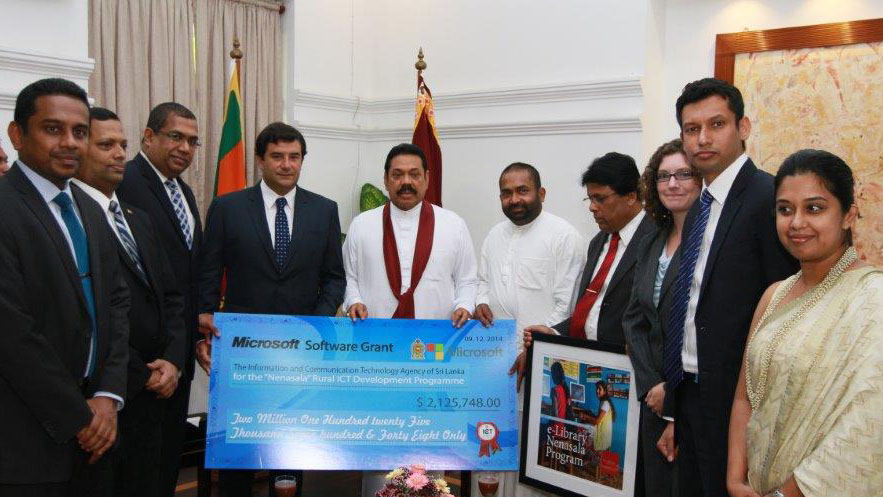The immense power of technology as a socio-economic leveler, with the potential to close the opportunity gap and boost development has been widely recognized in countries across the Asia Pacific. In Sri Lanka, technology has emerged as an important driver in improving the quality of life for its citizens, especially youths in rural and semi-urban communities. Programs that provide greater access to technology and education initiatives to equip youths with the right ICT skills to be productive in the future workplace as well as opening up opportunities for jobs with upward moving prospects, remain key concerns for the government.
During his recent visit to Sri Lanka, César Cernuda, President of Microsoft Asia Pacific reaffirmed Microsoft’s commitment to create real impact in the country through technology. On 9 December, Cernuda met with the Mahinda Rajapaksa, President of Sri Lanka to present a cheque symbolizing more than US$2 million worth of software grants to support the country’s Nenasala (Wisdom Outlet) program headed by the Information and Communication Technology Agency (ICTA).

The Nenasala e-learning program is implemented under the e-Sri Lanka initiative which aims to provide access to “diverse and unrestricted sources of information and means of communication” to all citizens. Nenasala Centers are located in rural areas to give residents increased access to high-quality IT devices and locally tailored information to help them improve their lives. In addition to access, the centers provide training to help people acquire basic computer and Internet skills, and to communicate through email and social media platforms.
The Microsoft software donated will be used at the Nenasala Centers to further develop learning opportunities for children living in the most remote areas.
Cernuda said: “ICT is a vital part of a country’s economic growth and the Sri Lankan government has the right vision in placing it as a key priority in the country’s nation building exercise. Providing free access to computers and the Internet to underserved Sri Lankans through the Nenasala programme will help to boost digital literacy and encourage economic development throughout the country.”
The Nenasala Programme won the Bill & Melinda Gates Foundation’s 2014 Access to Learning Award earlier this year, receiving a cash grant of US$1 million for its e-Library Nenasala Program (eLNP).
Over the course of his 2-day visit, Cernuda also met with government officials, the Information and Communication Technology Agency, as well as industry representatives to explore how Microsoft can further align with the Sri Lankan government’s plan to develop the country into an IT hub. Microsoft Sri Lanka is already partnering with the Sri Lanka Ministry of Education on several initiatives to elevate secondary and university level education in the country.
The numbers speak for themselves. Under the Microsoft Educator Network program, over 20,000 teachers have already been trained, reaching around 3 million students.
Over the years, Microsoft Sri Lanka has also empowered more than 500 rural schools and over 400 village ICT centres. Around 1 million young people in the country have been enabled with workforce skills and technical training through Microsoft YouthSpark and more than 10,000 students have contributed innovative solutions to tackle pressing social issues through Microsoft’s Imagine Cup.





